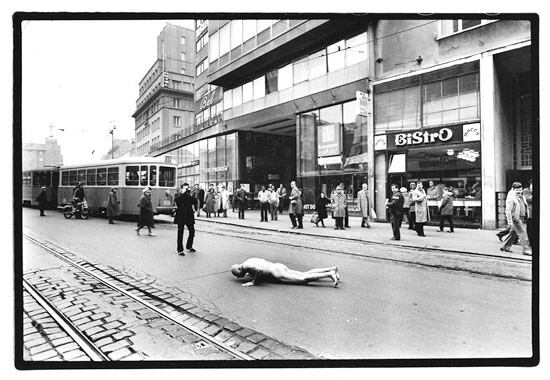1.
The historical socialist societies were usually severely criticized for their restrictions on sexual freedom. At the same time, the undergrounds of these same socialist societies were researched for manifestations of the sexuality that was supposedly suppressed because of ideological control. Researchers tried to discover the concealed practices of sexual liberation and subversive behavior, which would enable them to confirm that the expression of sexuality automatically subverts the…
Issue #54
April 2014
With:
Julieta Aranda, Brian Kuan Wood, Anton Vidokle, Keti Chukhrov, Boris Groys, Ana Ofak, Geert Lovink, Ross Wolfe, Walid Raad, Stephen Squibb, and E. C. Feiss
Spring is here, so we are naturally thinking about sex all the time. It was a busy winter with many personal calamities and meltdowns, and this only makes now a better time to think about sex. Big beautiful interspecies sex. Instrumentalized sex. Makeup sex and breakup sex. Overman sex and that business with the eunuch. Tender Marvin Gaye sex and also the weird stuff. Sex as the symbolic drainage area for desires that exceed and escape the society, but also as the visceral pelvic thrust…
View List
View Grid
9 Essays
April 2014
The modern/contemporary subject tends to react to a “system” with a desire to change it, to undermine its order or escape its control. At the same time, the dominant system seems almost omnipotent, because the technology at its disposal is incommensurate with the forces and capabilities of an individual. Thus, the fight against the system appears lost from the beginning. That is why the modern subject is so often described as the subject of an impossible desire, or rather of a desire for the…
Tenderness, unburdened sentiments, and freedom are rarely found in the cinematographic spectrum of the 1950s. Arne Mattsson’s 1951 film One Summer of Happiness already assures us with its title that we are going to see something perishable. Just as the water of the lake where the two protagonists swim glitters only on the surface, and only when the sun is going down, the moments they share in this fluid and forgiving medium are already doomed. The film’s rather predictable boy-meets-girl…
Slogans for 2014: “Hope is the mother of fools” (Polish saying) — Search for Yourself — “Views stated in this email are not my own and cannot be used against me” (footer) — The No-Excuses Truth to Understanding Anarchism (book title) — Tame Your Junk (three-day course) — “Hardwired for Nonsense” — “Make the most hegemoney with a career in Gramscience” (Ian Bogost) — “Why [popular technology] is [unexpected opinion]” (4chan) — Encountering Algorithmic Flags on Content — “not just…
In studies of repetition blindness, it is unclear whether the failure to recognize recurring items in a sequence owes primarily to an inability to notice similarities the second time something appears. Conflicting evidence indicates that it could just as easily involve an inability to remember the qualities something displayed the first time around. Psychologists are still split over this question. 1
A person must first be allowed to perambulate a structure, eyes gliding along its…
If you look closely, you can see the white lines on this fragment of wall.
And those who read Arabic can tell that these lines are actually letters and names. These are the names of men and women who have lived and worked in Lebanon as painters and sculptors over the past century. They are also the names that I have been receiving telepathically from artists in the future over the past nine years.
If, like me, you have experienced telepathic reception, then you know…
Continued from “ Genres of Capitalism, Part I ”
The first part of these notes presented spiritualism, commercialism, and productivism as three ways of reading “capitalism,” which have formed, over time, into genres. This exercise proceeded from a slow-building impression that we don’t know precisely what we are talking about when we talk about “capitalism.” Or simply that the way we talk, read, and write about “capitalism” is not as helpful as it could be. Part I ended by noting…
In response to Grant Kester’s “The Device Laid Bare: On Some Limitations in Current Art Criticism,” 1 I have some concerns about the characterization of my work, but more importantly, it seems there is perhaps another “device” to be laid bare here, at the risk of being stale. As Anselm Frank writes in issue #8 of this journal, “critique, itself a modern practice, has entered into the often lamented crisis we currently face, foregrounding its complicities in upholding the power of the…








